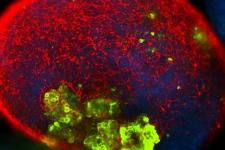In Vivo Genome Editing of Stem Cells Induced by LNP-Based Delivery of mRNA
By Jonathan D. Grinstein,
Genetic Engineering & Biotechnology News
| 07. 27. 2023
Part of the job as a pediatric hematologist for Michael P. Triebwasser, MD, PhD, is to take care of patients during their bone marrow transplantation. Just last week, he took care of a patient with a severe combined immunodeficiency (SCID) disorder and another with a bone marrow disorder.
Even though there has been progress in the use of autologous cells for ex vivo gene therapies for hematopoietic disorders like sickle cell disease and beta thalassemia, Triebwasser warns that it still requires the invasive procedure of taking cells out of the body, putting electrophoresis on these cells, and “conditioning” the patients to get rid of their own hematopoietic stem cells (HSCs) to make room for the gene-edited ones. That’s why Triebwasser said that he and others have been on the hunt for “the holy grail of HSC gene therapy”—in vivo genome editing of HSCs.
“In theory, we can replace that gene or correct it in some way and offer them a curative therapy that doesn’t have some of the same issues that hematopoietic stem cell transplantation (HSCT) does, namely graft versus host disease,” Triebwasser...
Related Articles
By Diaa Hadid and Shweta Desai, NPR | 01.29.2026
MUMBRA, India — The afternoon sun shines on the woman in a commuter-town café, highlighting her almond-shaped eyes and pale skin, a look often sought after by couples who need an egg to have a baby.
"I have good eggs,"...
By George Janes, BioNews | 01.12.2026
A heart attack patient has become the first person to be treated in a clinical trial of an experimental gene therapy, which aims to strengthen blood vessels after coronary bypass surgery.
Coronary artery bypass surgery is performed to treat...
By Staff, ScienceDaily | 01.05.2026
Scientists at UNSW Sydney have developed a new form of CRISPR technology that could make gene therapy safer while also resolving a decades-long debate about how genes are switched off. The research shows that small chemical markers attached to DNA
...
Following a long-standing CGS tradition, we present a selection of our favorite Biopolitical Times posts of the past year.
In 2025, we published up to four posts every month, written by 12 authors (staff, consultants and allies), some in collaboration and one simply credited to CGS.
These titles are presented in chronological order, except for three In Memoriam notices, which follow. Many more posts that are worth your time can be found in the archive. Scroll down and “VIEW...




